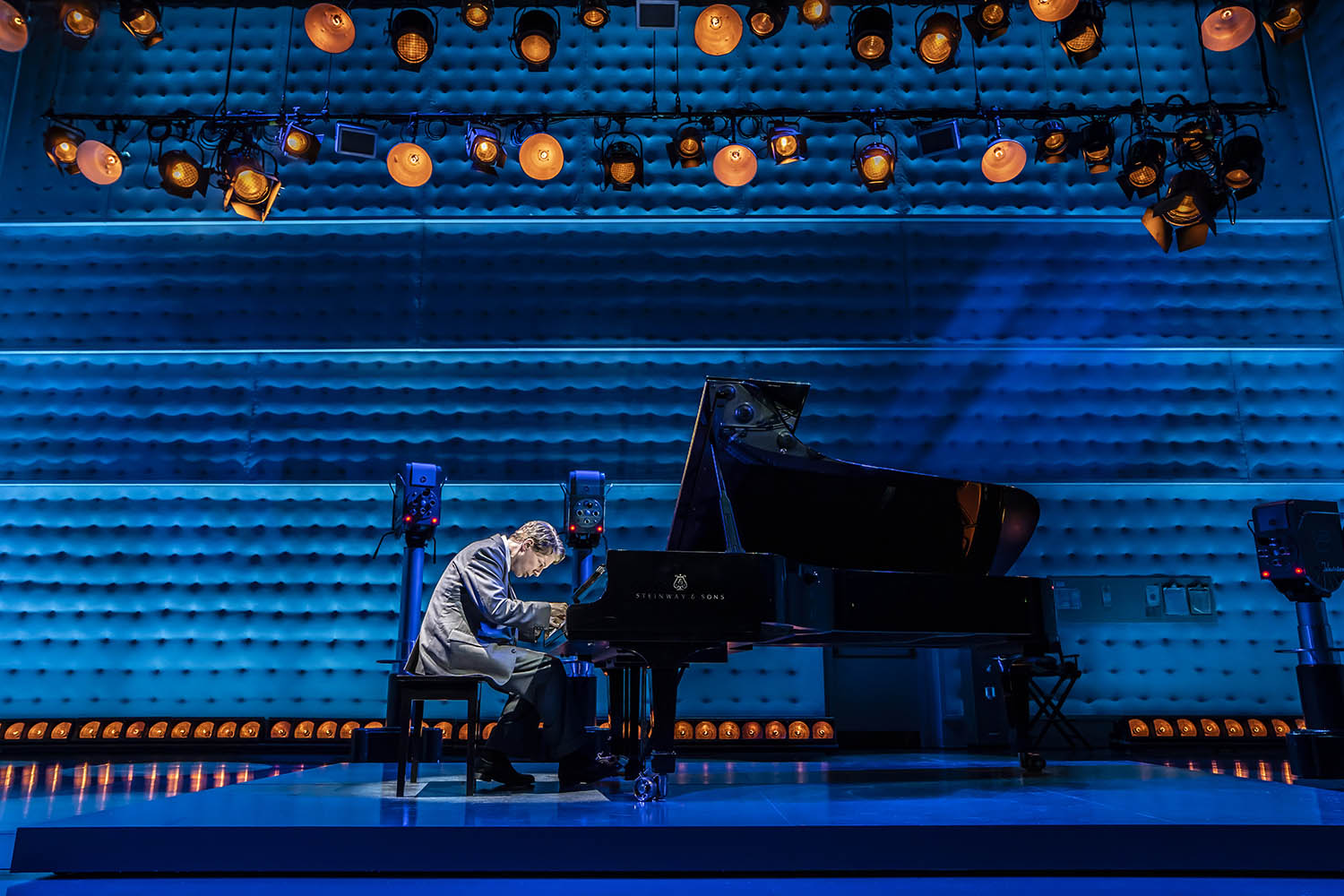It was the breakdown of Hollywood’s Golden Age and the Golden Age of the Hollywood breakdown. All that dark glamour: stars burning out behind a full face of makeup; the pills, the poise, the pretending. Oscar Levant, the American concert pianist and TV panellist, may not have been the most beautiful among the damned of the 1950s and 60s but, if this elegant production is to be believed, he is still a worthy case study: a wisecracking crack-up – psychosis polished into sparkling wit – wheeled out to entertain us on a late-night talkshow. It’s a work of neat and tidy neuroticism and Jewish comedy, cut from the same fine cloth as The Marvelous Mrs Maisel.
Good Night, Oscar, which follows the filming of an episode of Jack Paar’s The Tonight Show in 1958, has been transferred from Broadway to London, where it finds an ideal residence in the Barbican (the home of mid-century chic) if not an ideal audience in the British to whom Levant, despite starring in An American in Paris, is an unfamiliar personality. Sean Hayes (Will & Grace), comic timing precise as a metronome, won a Tony for his transfixing turn in what is in essence a one-man play: the supporting roles – namely his wife June (Rosalie Craig), Paar (Ben Rappaport) and his hospital orderly (Daniel Adeosun) – are diverting but largely mechanical, acting as vehicles for the drama and his punchlines. (My wife “drove me crazy then had me committed”, Oscar says. “It’s the perfect crime!”)
June, more minder than missus, has checked Oscar out of a psychiatric hospital for four hours for reasons that are not necessarily in her best interest or his, but are certainly to the benefit of hit-hungry Paar, who hopes the agent of chaos and controversy (at the time undergoing electroshock therapy) will bring in top ratings. Cue a reckoning with a furious producer, in whose eyes Oscar is a painkiller-addicted liability, and the filmset farce begins, interspersed with hammy auditory hallucinations – heralded by a swoop of indigo lighting and the opening clarinet of Rhapsody in Blue – as well as the camp ghost of its composer: Levant was a friend and interpreter of George Gershwin who, in eyeliner and tailcoat, appears here as much a creature of Tim Burton’s imagination as Oscar’s.
Music “drowns out the dreadful thoughts in his brain” and, in this show, it offers respite from an inner monologue externalised in excited dialogue. There is too much explanation – or rather, diagnosis – but Doug Wright’s script is zippy, fast-paced and very funny (this is gag-a-minute comedy betting on the law of numbers). When Oscar finally settles into the hot seat, he’s zinging for his supper – about politics, religion, sex (“I’ve been married 19 years so I’m very nostalgic about it”) and his peers (Elizabeth Taylor, “always a bride, never a bridesmaid”; “Now that Marilyn Monroe is kosher, Arthur Miller can eat her”). Hayes, slouched and shaking – with currant eyes and shrivelled expression – goes from “Eeyore in a cheap suit” to chemically enhanced performing monkey. He fully inhabits the role, never more poignantly than when Oscar is forced to sit at the piano and play a tortured, transportive seven-minute excerpt of Rhapsody (Hayes is a classically trained pianist).
This is, then, not a discomforting portrayal of mental anguish but an eerily comfortable one: in the low-lit stalls, lulled by a smooth jazz talkshow theme, it takes a moment to realise the walls of the studio set are padded like an asylum cell. Across the hour-and-40-minute runtime, the mood is breezy – surprising, given the subject, and refreshing. It is too finely tuned, but like the Rhapsody – with its blue notes, its wailing swoop – Good Night, Oscar makes a melody of melancholy.
Good Night, Oscar runs at the Barbican, London, until 21 September
Photograph by Johan Persson
Newsletters
Choose the newsletters you want to receive
View more
For information about how The Observer protects your data, read our Privacy Policy

